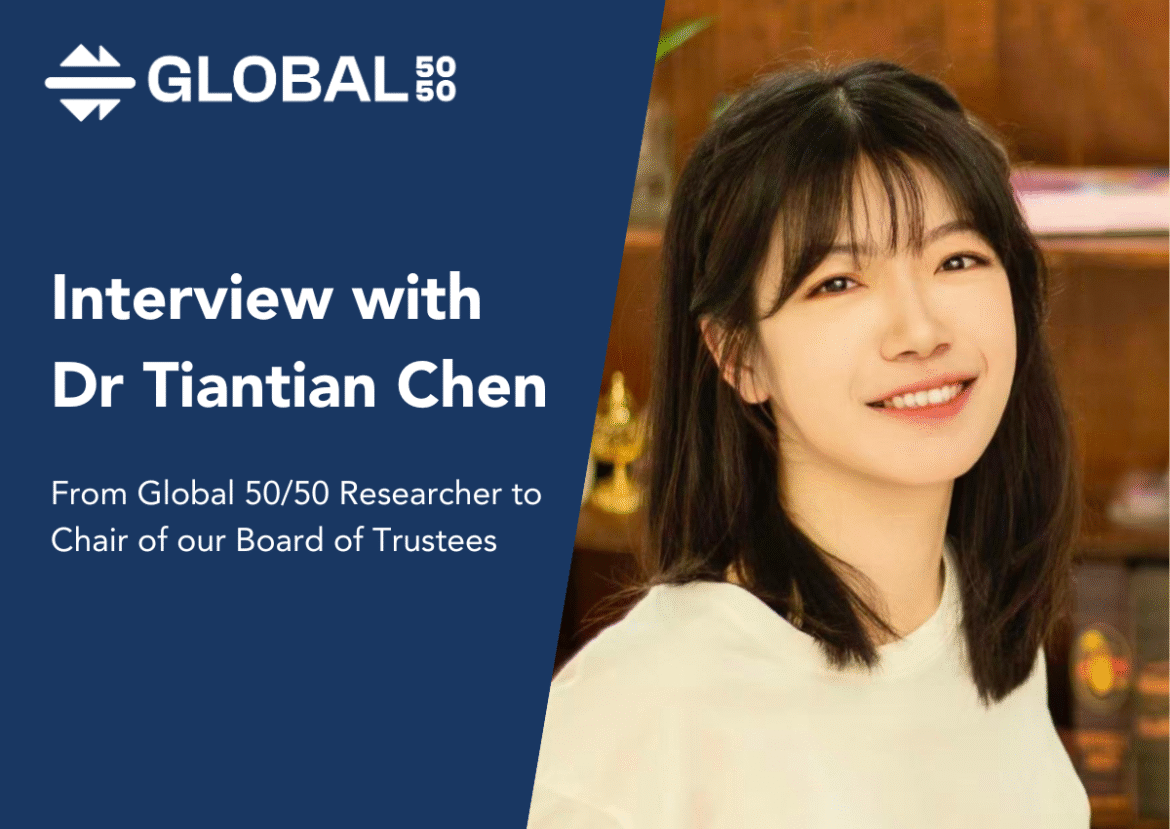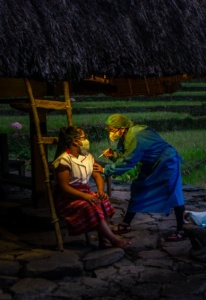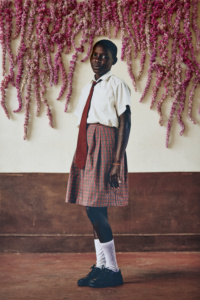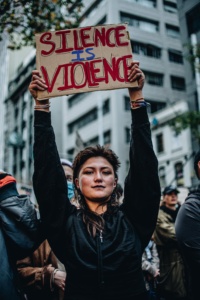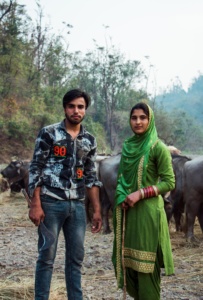Meet Dr Tiantian Chen – Chair of our Board of Trustees
To mark Trustees’ Week 2025, we’re sharing a conversation with Dr Tiantian Chen, Chair of the Board of Trustees at Global 50/50.
Dr Tiantian Chen reflects on her journey from researcher to board chair, the values that drive her, and why independent accountability and data remain vital tools for gender justice in an era of rollback and resistance.
You began life a long way from Cambridge. Can you tell us about your background and what shaped your early interest in gender and power?
I was born in a small village in Jiangsu Province, China, where rice paddies stretched to the horizon. When I moved to Shanghai at ten, I experienced two very different worlds: one rooted in community, another driven by ambition and competition.
At Peking University, I studied social science but realised my real curiosity was about power, who has it, who doesn’t, and why. That question eventually took me to Johns Hopkins University in the US and later to Cambridge in the UK for my PhD, where I explored how gender norms shape women’s health choices in China. Those experiences taught me that inequality is rarely accidental, it is structured, systemic, and deeply embedded in our institutions.
What first brought you to Global 50/50?
In 2017 I joined what was then Global Health 50/50 as a researcher for the first report. We were a small team gathering data on about 150 organisations to see who led, who benefited and who was left out. I remember the excitement of realising that publishing these comparisons publicly could spark accountability. It was evidence not just for understanding the problem, but for driving change.
How does it feel to move from researcher to Chair of the Board of Trustees?
It feels both humbling and poetic. Global 50/50 taught me early on that leadership and knowledge are inseparable. To now chair the organisation I once collected data for shows that we practise what we preach, valuing evidence, inclusion and integrity at every level. It also demonstrates that boards can look different; that deep mission knowledge can be as important as managerial experience.
Why is this appointment significant within the UK charity sector?
In the UK, charity chairs often come from corporate or political backgrounds. My appointment shows another path is possible, one that recognises research, lived experience and global perspective as sources of leadership, and makes space for those who have not always been heard. As a Chinese-born academic working in the UK, I bring an understanding of how power operates across cultures and systems. For me, this is also about representation: ensuring that those shaping accountability work reflect the diversity of the communities we serve.
What motivates you personally to work for gender justice and health equity?
During my PhD I studied why single women in China were restricted from freezing their eggs. The experience revealed how stigma and policy intersect to limit women’s choices. Later, while tracking COVID-19 data at Global 50/50, I saw gendered differences in infection, health seeking behaviour, hospitalisation and death. These patterns made clear that gender is not a side issue in health, it’s a determinant of who lives, who thrives, and who is counted.
I’m motivated by the possibility that research, when made visible and accessible, can drive systemic change.
What does Global 50/50’s expansion beyond health mean to you?
It’s a natural evolution. The barriers to gender and social justice don’t end at hospital doors, they run through the courts, the markets and the ministries that govern everyday life.
By applying our model of data-driven accountability to new systems of power, through Global Justice 50/50 and in the finance sector, we can expose inequities wherever they are produced. The questions remain the same: Who governs? Who benefits? Who is excluded? But the answers will illuminate new pathways to justice.
- WHEN THE MOUNTAIN WON’T MOVE…, (Philippines, 2023), Gina C. Meneses
- THE RIGHT TO PLAY, (Kenya, 2022), Lee-Ann Olwage
- WARMI JILAQATA, (Peru, 2015), David Martín Huamaní Bedoya
- SILENCE IS VIOLENCE, (New Zealand, 2020), Ainsley Duyvestyn Smith
- DINNER TIME, (India, 2023), Talia Woodin
What are your immediate priorities as Chair?
My first priority is to strengthen collaboration between trustees, leadership and staff so that governance enables, not hinders, creativity. I also want to diversify our partnerships so that we can have even greater impact and ensure our strategy remains ambitious but sustainable. Above all, I will safeguard our independence, because credibility is Global 50/50’s greatest asset.
What long-term vision do you have for Global 50/50?
I want us to be the world’s go-to source of evidence and accountability on gender and power across multiple systems. That means combining rigorous research with activism and making our data accessible to anyone, whether a policymaker in Nairobi or a student in Newcastle.
In the longer term, I’m also interested in how technology and artificial intelligence can both advance and undermine equality. We must understand and influence that terrain.
We are living through a period of backlash against gender justice. How should organisations respond?
With courage and evidence. The best response to the backlash against equity, inclusion and fairness is transparency, publishing data, showing what works, and keeping the conversation grounded in facts rather than fear.
At Global 50/50 we do not treat gender justice as charity; we see it as what is fair and what is strategic in driving impact. We believe that independent accountability is how trust is rebuilt when the politics of gender justice become contested.
Partnerships are central to Global 50/50’s approach. What makes an effective partnership for change?
Partnerships work when they are built on respect and shared purpose, not hierarchy. We collaborate with universities, multilateral agencies and grassroots organisations alike, learning from and leveraging each other’s strengths.
For example, our partnership with the Centre for Research on Environment, Health and Population Activities (CREHPA) in Nepal helps us test and adapt our methods in local contexts, ensuring our research is globally credible but locally grounded. In Kenya and India, collaborations with the African Population and Health Research Center (APHRC) and the International Center for Research on Women (ICRW) deepen our regional understanding of gender and health. And at the global level, partnerships with organisations such as UN Women and the International Food Policy Research Institute (IFPRI) help us connect evidence to policy and amplify impact across sectors.
What message would you share with emerging leaders in gender and global health?
Change takes time, and setbacks are part of progress. Celebrate small victories, they accumulate into transformation. Lead with empathy, curiosity and evidence. And remember that leadership is not about titles; it’s about accountability, to the people our work is meant to serve.

